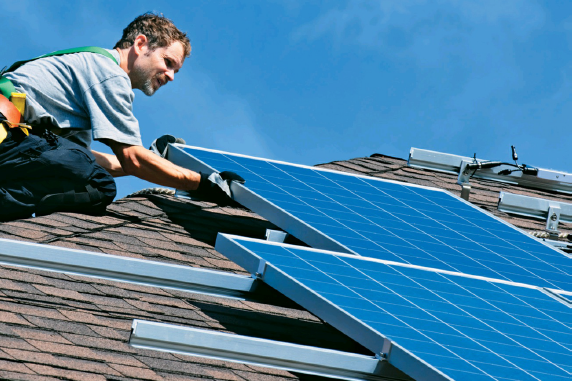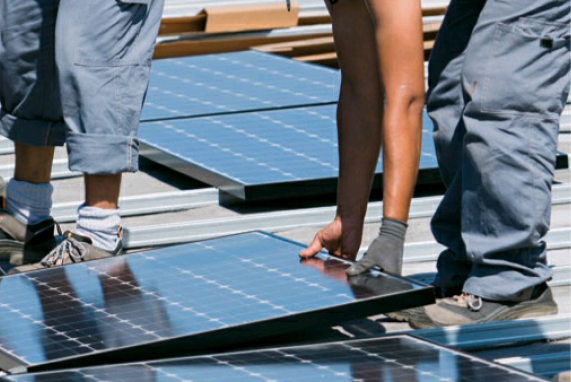

 Companies that provide solar equipment and system design, installation, and maintenance services
are rising in number every year. A few of these were around during the lean years of the 1980s and
’90s, but many more have sprouted up in the last decade or so. In any case, this is now a highly
competitive industry, so you can, and should, expect great service at competitive prices.
The reputation and reliability of your local solar provider are important considerations, but
perhaps more important is the stability of the original equipment manufacturers (OEMs) who produce
the main parts of your system and who carry those long warranties. Many of these are large, wellestablished
companies with expertise in energy and/or electronics, so it’s a good bet they’ll be
around in 20 or 25 years to honor their product warranties. Always discuss warranties carefully with
your solar provider.
Professional installation may run you around 15% of the total system cost—quite a low rate for the
home improvement industry—and that amount is subject to rebates and credits, which are based on
installed system prices.
Before giving you a quote for the system package, a solar provider will want to know about your
home, what type of roofing you have, and what the southern exposure is like. To ballpark the size of
system you’ll need, they’ll probably look at your utility bills from the past year and ask how much
power you want to get from solar: Will it cover all household demand or just a portion of it? You
may have to pay a fee to cover the provider’s legwork required for working
Companies that provide solar equipment and system design, installation, and maintenance services
are rising in number every year. A few of these were around during the lean years of the 1980s and
’90s, but many more have sprouted up in the last decade or so. In any case, this is now a highly
competitive industry, so you can, and should, expect great service at competitive prices.
The reputation and reliability of your local solar provider are important considerations, but
perhaps more important is the stability of the original equipment manufacturers (OEMs) who produce
the main parts of your system and who carry those long warranties. Many of these are large, wellestablished
companies with expertise in energy and/or electronics, so it’s a good bet they’ll be
around in 20 or 25 years to honor their product warranties. Always discuss warranties carefully with
your solar provider.
Professional installation may run you around 15% of the total system cost—quite a low rate for the
home improvement industry—and that amount is subject to rebates and credits, which are based on
installed system prices.
Before giving you a quote for the system package, a solar provider will want to know about your
home, what type of roofing you have, and what the southern exposure is like. To ballpark the size of
system you’ll need, they’ll probably look at your utility bills from the past year and ask how much
power you want to get from solar: Will it cover all household demand or just a portion of it? You
may have to pay a fee to cover the provider’s legwork required for working
 While the environmental benefits of solar electricity are obvious and irrefutable, most people looking
into adding a new solar system need to examine the personal financial implications of doing so. PV
systems cost only a small fraction of what they did 30 years ago, but they’re still quite expensive. For
example, a three-kilowatt system capable ofof supplying most or all of the electricity for a typical green
home can easily cost $30,000 (before rebates and credits) and take 20 to 25 years to pay for itself in
reduced energy bills. An off-the-grid system will cost even more. Nevertheless, depending on the
many factors at play, going solar can be a sound investment with a potentially high rate of return.
One way to consider solar as an investment is to think of it as paying for a couple of decades’
worth of electricity bills in advance. Thanks to the long warranties offered by manufacturers and the
reliability of today’s systems, the costs of maintenance on a system are predictably low. This means
that most of your total expense goes toward the initial setup of the system. If you divide the setup cost
(after rebates and credits) by the number of kilowatt hours (kWh) the system will produce over its
estimated lifetime, you’ll come up with a per-kWh price that you can compare against your current
utility rate. Keep in mind that your solar rate, as it were, is locked in, while utility rates are almost
certain to rise over the lifetime of your system.
While the environmental benefits of solar electricity are obvious and irrefutable, most people looking
into adding a new solar system need to examine the personal financial implications of doing so. PV
systems cost only a small fraction of what they did 30 years ago, but they’re still quite expensive. For
example, a three-kilowatt system capable ofof supplying most or all of the electricity for a typical green
home can easily cost $30,000 (before rebates and credits) and take 20 to 25 years to pay for itself in
reduced energy bills. An off-the-grid system will cost even more. Nevertheless, depending on the
many factors at play, going solar can be a sound investment with a potentially high rate of return.
One way to consider solar as an investment is to think of it as paying for a couple of decades’
worth of electricity bills in advance. Thanks to the long warranties offered by manufacturers and the
reliability of today’s systems, the costs of maintenance on a system are predictably low. This means
that most of your total expense goes toward the initial setup of the system. If you divide the setup cost
(after rebates and credits) by the number of kilowatt hours (kWh) the system will produce over its
estimated lifetime, you’ll come up with a per-kWh price that you can compare against your current
utility rate. Keep in mind that your solar rate, as it were, is locked in, while utility rates are almost
certain to rise over the lifetime of your system.
Now, about those rebates and credits: In many areas, homeowners going solar can receive sizable rebates through state, local, or utility-sponsored programs, in addition to federal tax credits, as applicable. All told, these financial incentives can add up to 50% or more of the total setup cost of a new PV system. To find out about what incentives are available through any of these sources, check out the Database of State Incentives for Renewables & Efficiency at http://www.dsireusa.org or the UK scheme https://www.gov.uk/feed-in-tariffs/overview . Established solar businesses in any given area are also very well informed about incentives available to local residents.

First class
Got 2 suppliers ,both phone me within 24hours ,both made appointments to come and see me the following day.
John Howard.
Great all round service.
Both the survey guy and installer were really nice guys.The price quoted was good, so much so we cancelled 3 other appointments we had made
and the work was done on the day arranged.The lady on the phone was also very nice and good at customer relations more than some i could mention.
Angela.